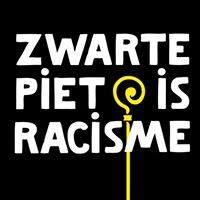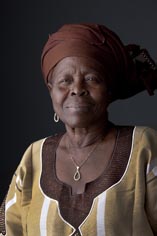So I haven’t written anything in a while. It might seem strange that I remained silent during these times of all times. Me, a black woman of color in Holland, how could I not say anything about the annual blackface celebration? But I did not, and still do not, know what to say. What more do they want us to say? Do they need more compelling arguments, historical facts or personal testimonies? What can I possibly say?
I went to a protest a few weeks ago. A friend of mine organized one in her hometown of Weesp, a small town near Amsterdam. This too has become an annual thing. Two years ago she held her first anti-Zwarte Piet protest there, alone. A cop took the sign she was holding up away from her, the people of the town who have seen her grow up intimidated and assaulted her. The images were spread on social media, since then more people joined her.
We were escorted by policemen to an assigned place where we were allowed to protest. That’s right, in Holland you need to ask for permission in order to hold a peaceful protest, and then you’ll get assigned a place. But we’ll play the game if that’s what it takes to be heard.
We came into a hostile environment, as we expected. We were mocked, people asked us if we were employed; “You probably don’t have jobs right?”. It was a Saturday, and obviously the people asking weren’t sitting in an office somewhere either, but screw logic. People were filming us and taking our pictures, who knows where these images ended up. Many passed us by and shook their heads or made dismissive hand gestures, others angrily flipped us the bird, young men with their friends and older women holding their shopping bag. There were people who tried to come up to us violently, fortunately they were stopped by the police. Some came up to us to ask why we were protesting, after being provided with an answer they’d say that we were falling into victimhood and that we needed to get over it. There was no right answer to their question.
The same day another group of activists, on their way to Dokkum, a town in the north of Holland where the national festivity of the entry of Saint-Nicholas into the country was to be celebrated, got blocked on the highway by a group of extreme right counter activists. They never arrived in Dokkum. The police didn’t arrest any of the counter-activists blocking the highway, they seemed to be fraternizing with them instead, shaking their hands and patting them on their backs, while ignoring the activists waiting in the busses, frightened and unsure of what was going to happen. Politicians in the next days regretted the events, yet said they understood the sentiments of the counter-activists. There were voices saying activists should wait until after December 5th to discuss Zwarte Piet. Now now, not while the children are celebrating. Don’t expose innocent children to protests. Nobody talked of the innocence of black children, what they go through during this time of the year. Their eyes see too much too soon, they experience too much too soon. During this time they are being introduced to a social phenomenon that will haunt them for the rest of their lives: racism. Now they know. But racism can wait until after they are done with elementary school and need to apply for high schools, or after they graduate with a degree and enter the job market. Not now, not while they are suppose to be celebrating.
One of the houses I pass by each morning now has a picture of a little girl posing with 2 people dressed as Zwarte Piet pressed against the window. The picture isn’t hanging on a wall inside the house, or put in a nice frame on a sidetable, it is pressed against the front ground floor window. Whoever is living inside is not able to look at their own picture. It has not been put there so that the family could enjoy and reminisce about a joyous occasion. Who is meant to see it?
I saw two Zwarte Pieten this evening, while walking through my neighborhood, on their way to a celebration. They might have been the last ones I will have to see this season. They were laughing and goofing around, however whatever innocence they may have once had is now gone. Now they know.
After tonight it will be December 6th all Saint Nicholas festivities will be over and we will be preparing for Christmas. We will now be allowed to discuss Zwarte Piet because the children will have had their fun. But what is there left to say?

